Bartlett's Bizarre Bazaar
Comment, Comics and the Contrary. Contact: aj_bartlett1977*at*yahoo*dot*co*dot*ukTuesday, August 31, 2004
Swamped?
I think that this is a story worth spreading, empirical ammunition to shoot down racists and xenophobes. The United Nation High Commission on Refugees has reported that the number of applications for asylum in the industrialised world has fallen to its lowest levels since 1987. Of this industrialised world, the richest and most powerful nations on Earth, Britain is third in the table, behind France and the United States.
I would write more, but to do this story justice and to give proper vent to my anger – carefully channelled into my writing – I would need a bit more time than I have available at the moment. The ideologues of small-minded, ignorant and intolerant nationalism deserve more than ten minutes of hasty tapping on a keyboard late at night. They prove themselves to be masters of the exaggeration and the lie, and for what purpose? To make people hate?
One thing I will say, however, is that falling to third place in the table of applications is not an achievement. I hope that one day, the nation that I am a part of is a decent, tolerant nation, the first nation that persecuted people turned to for refuge.
I would write more, but to do this story justice and to give proper vent to my anger – carefully channelled into my writing – I would need a bit more time than I have available at the moment. The ideologues of small-minded, ignorant and intolerant nationalism deserve more than ten minutes of hasty tapping on a keyboard late at night. They prove themselves to be masters of the exaggeration and the lie, and for what purpose? To make people hate?
One thing I will say, however, is that falling to third place in the table of applications is not an achievement. I hope that one day, the nation that I am a part of is a decent, tolerant nation, the first nation that persecuted people turned to for refuge.
Saturday, August 28, 2004
Preview - The Song of Wayland
Here's the first two pages of the 48-page story The Song of Wayland. The black and white art is by Jorge Munoz, who can be contacted on yorko1*at*lycos*dot*com. The story has been written in digestible 12-page slices. I hope that my writing will do this Jorge's art justice, and that the paper publication (still quite some time away) gives his work the showing it deserves. I'll post soon with an spoiler-free outline of the story.
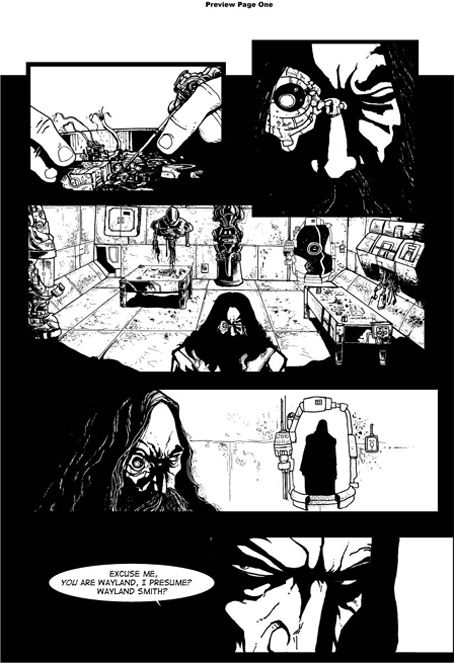
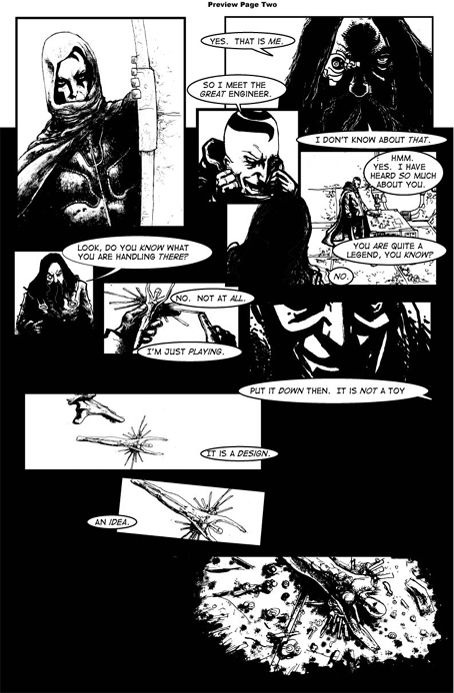


Monday, August 23, 2004
Protests, Police and Political Persuasion
On Saturday lunchtime I was in Cardiff city centre and was witness to a Reclaim the Streets demonstration. I was amazed at the number of police in attendance at what seemed to be an entirely peaceful demonstration. Of course it caused some disruption, as a demonstration advocating reclaiming the streets must be. But whether there is a justification for forming a human wall of police officers around a demonstration, forcibly restricting the movement not just of the group en masse but of individuals, is a question that must be answered every time the police are deployed in such force.
Nevertheless, there were smaller groups of demonstrators involved in direct action outside the main body of the demonstration. I watched as several small groups blocked St. Mary’s Street, holding up the traffic for a short period of time before moving aside, allowing some traffic to pass and then blocking the road again. These roadblocks were temporary and dignified, even if one driver did physically push a demonstrator off the road. According to icWales ten demonstrators were arrested, but no details have been given of criminal charges or pending prosecutions. I will return to the icWales coverage later, as I will to the only example of aggressive act that I witnessed, except, of course, for the forceful corralling of the demonstration.
The main body of the demonstration was guided into Sophia Gardens, where they were loosely ringed by police officers. As I followed the progress of this demonstration I watched the two police cameramen. These filmed and took photographs of the both the demonstrators and in some cases spectators of the demonstration. I wondered what this surveillance was for. The demonstration was taking place in Cardiff city centre. Like all city centres it is dotted with CCTV cameras, which appear to prove sufficient to monitor and record acts of public disorder – genuine destruction and violence – that attends such disruptive occasions as football matches and Friday nights. But even if the CCTV surveillance was not available, the people being filmed and photographed were entirely encircled by the police and were behaving in an overwhelmingly peaceful manner. It is hard to argue that this was an effective or proportionate use of police resources in the collection of evidence of the commission of crimes.
So it seemed to me that the answer to the question - why did the police deploy cameramen at this protest? - was political. For a few moments I thought that I had found the answer in the collection of intelligence on groups that may engage in criminal activity. If we put aside the dubious nature of the practice in terms of civil liberties, we are still faced with a major problem of employing this explanation as our justification. That is; how would these hundreds of photos and several hours of video footage be filed? How could they be filed? If they simply rest in an archive marked ‘Reclaim the Streets, Cardiff, 2004’ then, not only what business is it of the police, but what use is it to them.
And then it struck me. I did not join in the protest. I did not even go and speak to anybody taking part. If I did, I would have had my picture taken and very possibly would have been confined and my movements controlled with the rest of the demonstration. This was an exercise in intimidation. Not of the demonstrators, but of the surrounding onlookers. Who would want to join in this protest unless they are entirely committed to the cause? The implication of the cameramen’s presence was not so much, ‘we’ve got a file on you, demonstrator’, but, ‘we’ll get a file on you, if you join in’. Much the same reasoning can be applied to the wall of police, which tells onlookers, ‘these are dangerous, violent extremists, so don’t join in’. When a demonstration is reduced to a rump of the highly committed, the arguments of the demonstration can be effectively delegitimised, being easy to represent as extreme and lacking broad support. Reports of the demonstration can say, ‘look, the demonstration was tiny and almost entirely composed of peacenik commie hippies’. This was, it seemed to me, to be a highly effective and covertly political strategy to discourage protest.
This argument is bolstered by a look at the policing and reporting of the fuel protests earlier this year. I watched the go-slow procession of trucks through Cardiff city centre earlier this year. The noise from their horns was deafening and the disruption to the movement of traffic was significantly greater. But I did not see a police presence of any significance, and if police cameramen were present they were particularly discreet. Why are these two events, demonstrations with much the same aim as regards civil disobedience, policed in such a markedly different manner? The answer must, in part lie with their diametrically opposed political agendas. Consider the coverage of the fuel protests on icWales. The fuel protests are covered in great context and the organisers and given suitable space to voice their opinions. In comparison, the coverage of the Reclaim the Streets demonstration has so far amounted to this:
Arrests at capital's reclaim the streets demo
Aug 22 2004
Laura Kemp, Wales on Sunday
TEN protesters were arrested in Cardiff city centre yesterday when a street party turned to chaos.
South Wales Police were called to the Reclaim The Streets demo at lunchtime when a number of the anti-capitalist group members stepped into the roads.
A police spokesman said: "As the protest developed some roads in Cardiff were obstructed for a very short time."
Chief Inspector Andy Morgan said: "The group has been allowed to hold its protest with minimum disruption."
'Minimum disruption’ and obstructions lasting ‘a very short time’ does not sound like chaos. Are we to assume that Laura Kemp is stupid for writing an article that is only 77 words long but is internally inconsistent? Or must we conclude that this is politically aligned reporting masquerading as unbiased journalism? The American line of objectivity often amounts to ‘no-context’ reporting. Be aware that only the headline and the first line of any report appear on the icWales news listings. Readers are presented with the words ‘arrests’ and ‘chaos’, fixing an image before the article is even read – if it is read. But by placing the moderate comments of Chief Inspector Morgan in the last lines Laura Kemp hopes to, and will be able to, sustain a defence of impartiality. A defence, of course, is quite different from a rigorously argued justification. That, she could not manage.
Where do I stand on the subject of Reclaim the Streets? First, I believe that the streets and other public spaces are a valuable resource for interpersonal interaction in any democracy. But I feel that they are effectively private property. The exploitation of public space is only allowed when there is a potential for profit. Why else would we permit 30,000 people to gather for a football match, or tolerate the levels of public disorder that are associated with alcohol consumption? Unlike a demonstration, these activities add nothing to our democracy, and democracy, as we have been told, is a state of government, perhaps the only state of government, worth killing and dying for. Yet football and booze are given privileges that democracy is not? Please excuse my bafflement.
I am also struck by the political role of the car. The car is a highly political object, why else would there be protests both for and against its use. Its political role goes further than arguments about the consumption of oil or the rate of fuel tax, however. Like all aspects of our physical environment, the car also shapes our thinking. And I am coming to believe that the car is an object that pushes people towards fascist tendencies. I do not use this word lightly. The car, it seems to me, acts to individualise everybody. Next time you watch rush-hour traffic, count the number of cars that contain only one person. Individualised, each person rarely considers the needs and desires of other road users. Consider the anger many placid people seem to develop once behind the wheel. Watch the mean, aggressive faces of the drivers at rush-hour. Other people are simply obstacles to be overcome by the action of the individual alone. Consider also the culture that develops around the car, celebrating force, in terms of speed and acceleration, and power, in terms of both the car being a wealth-signifying status symbol and in terms of the engine of the car itself.
Why did the driver climb from his car and manhandle the demonstrator off the road? Did he think that his needs were greater than those of the demonstrator? Why? What was he doing? Where was he going? Shopping? Why did he immediately resort to force? Were his greater needs incommunicable? Were they incommunicable because in any reasonable reckoning, the driver had no need to drive through central Cardiff? He could have walked. He could have got the bus.
I am glad that I witnessed what I did on Saturday. Despite the unthinking, unreasoning grumbles of many, this demonstration was successful. It demonstrated to me the manner in which protest movements are discouraged, marginalised and stigmatised by the police and the press. And forced me to ask questions of the use of our streets and public placed, demonstrating that despite the title, public space is private space after all. And it offered be a microcosmic demonstration of the unhealthy role of the car in shaping our attitudes. My thanks to Reclaim the Streets.
Nevertheless, there were smaller groups of demonstrators involved in direct action outside the main body of the demonstration. I watched as several small groups blocked St. Mary’s Street, holding up the traffic for a short period of time before moving aside, allowing some traffic to pass and then blocking the road again. These roadblocks were temporary and dignified, even if one driver did physically push a demonstrator off the road. According to icWales ten demonstrators were arrested, but no details have been given of criminal charges or pending prosecutions. I will return to the icWales coverage later, as I will to the only example of aggressive act that I witnessed, except, of course, for the forceful corralling of the demonstration.
The main body of the demonstration was guided into Sophia Gardens, where they were loosely ringed by police officers. As I followed the progress of this demonstration I watched the two police cameramen. These filmed and took photographs of the both the demonstrators and in some cases spectators of the demonstration. I wondered what this surveillance was for. The demonstration was taking place in Cardiff city centre. Like all city centres it is dotted with CCTV cameras, which appear to prove sufficient to monitor and record acts of public disorder – genuine destruction and violence – that attends such disruptive occasions as football matches and Friday nights. But even if the CCTV surveillance was not available, the people being filmed and photographed were entirely encircled by the police and were behaving in an overwhelmingly peaceful manner. It is hard to argue that this was an effective or proportionate use of police resources in the collection of evidence of the commission of crimes.
So it seemed to me that the answer to the question - why did the police deploy cameramen at this protest? - was political. For a few moments I thought that I had found the answer in the collection of intelligence on groups that may engage in criminal activity. If we put aside the dubious nature of the practice in terms of civil liberties, we are still faced with a major problem of employing this explanation as our justification. That is; how would these hundreds of photos and several hours of video footage be filed? How could they be filed? If they simply rest in an archive marked ‘Reclaim the Streets, Cardiff, 2004’ then, not only what business is it of the police, but what use is it to them.
And then it struck me. I did not join in the protest. I did not even go and speak to anybody taking part. If I did, I would have had my picture taken and very possibly would have been confined and my movements controlled with the rest of the demonstration. This was an exercise in intimidation. Not of the demonstrators, but of the surrounding onlookers. Who would want to join in this protest unless they are entirely committed to the cause? The implication of the cameramen’s presence was not so much, ‘we’ve got a file on you, demonstrator’, but, ‘we’ll get a file on you, if you join in’. Much the same reasoning can be applied to the wall of police, which tells onlookers, ‘these are dangerous, violent extremists, so don’t join in’. When a demonstration is reduced to a rump of the highly committed, the arguments of the demonstration can be effectively delegitimised, being easy to represent as extreme and lacking broad support. Reports of the demonstration can say, ‘look, the demonstration was tiny and almost entirely composed of peacenik commie hippies’. This was, it seemed to me, to be a highly effective and covertly political strategy to discourage protest.
This argument is bolstered by a look at the policing and reporting of the fuel protests earlier this year. I watched the go-slow procession of trucks through Cardiff city centre earlier this year. The noise from their horns was deafening and the disruption to the movement of traffic was significantly greater. But I did not see a police presence of any significance, and if police cameramen were present they were particularly discreet. Why are these two events, demonstrations with much the same aim as regards civil disobedience, policed in such a markedly different manner? The answer must, in part lie with their diametrically opposed political agendas. Consider the coverage of the fuel protests on icWales. The fuel protests are covered in great context and the organisers and given suitable space to voice their opinions. In comparison, the coverage of the Reclaim the Streets demonstration has so far amounted to this:
Arrests at capital's reclaim the streets demo
Aug 22 2004
Laura Kemp, Wales on Sunday
TEN protesters were arrested in Cardiff city centre yesterday when a street party turned to chaos.
South Wales Police were called to the Reclaim The Streets demo at lunchtime when a number of the anti-capitalist group members stepped into the roads.
A police spokesman said: "As the protest developed some roads in Cardiff were obstructed for a very short time."
Chief Inspector Andy Morgan said: "The group has been allowed to hold its protest with minimum disruption."
'Minimum disruption’ and obstructions lasting ‘a very short time’ does not sound like chaos. Are we to assume that Laura Kemp is stupid for writing an article that is only 77 words long but is internally inconsistent? Or must we conclude that this is politically aligned reporting masquerading as unbiased journalism? The American line of objectivity often amounts to ‘no-context’ reporting. Be aware that only the headline and the first line of any report appear on the icWales news listings. Readers are presented with the words ‘arrests’ and ‘chaos’, fixing an image before the article is even read – if it is read. But by placing the moderate comments of Chief Inspector Morgan in the last lines Laura Kemp hopes to, and will be able to, sustain a defence of impartiality. A defence, of course, is quite different from a rigorously argued justification. That, she could not manage.
Where do I stand on the subject of Reclaim the Streets? First, I believe that the streets and other public spaces are a valuable resource for interpersonal interaction in any democracy. But I feel that they are effectively private property. The exploitation of public space is only allowed when there is a potential for profit. Why else would we permit 30,000 people to gather for a football match, or tolerate the levels of public disorder that are associated with alcohol consumption? Unlike a demonstration, these activities add nothing to our democracy, and democracy, as we have been told, is a state of government, perhaps the only state of government, worth killing and dying for. Yet football and booze are given privileges that democracy is not? Please excuse my bafflement.
I am also struck by the political role of the car. The car is a highly political object, why else would there be protests both for and against its use. Its political role goes further than arguments about the consumption of oil or the rate of fuel tax, however. Like all aspects of our physical environment, the car also shapes our thinking. And I am coming to believe that the car is an object that pushes people towards fascist tendencies. I do not use this word lightly. The car, it seems to me, acts to individualise everybody. Next time you watch rush-hour traffic, count the number of cars that contain only one person. Individualised, each person rarely considers the needs and desires of other road users. Consider the anger many placid people seem to develop once behind the wheel. Watch the mean, aggressive faces of the drivers at rush-hour. Other people are simply obstacles to be overcome by the action of the individual alone. Consider also the culture that develops around the car, celebrating force, in terms of speed and acceleration, and power, in terms of both the car being a wealth-signifying status symbol and in terms of the engine of the car itself.
Why did the driver climb from his car and manhandle the demonstrator off the road? Did he think that his needs were greater than those of the demonstrator? Why? What was he doing? Where was he going? Shopping? Why did he immediately resort to force? Were his greater needs incommunicable? Were they incommunicable because in any reasonable reckoning, the driver had no need to drive through central Cardiff? He could have walked. He could have got the bus.
I am glad that I witnessed what I did on Saturday. Despite the unthinking, unreasoning grumbles of many, this demonstration was successful. It demonstrated to me the manner in which protest movements are discouraged, marginalised and stigmatised by the police and the press. And forced me to ask questions of the use of our streets and public placed, demonstrating that despite the title, public space is private space after all. And it offered be a microcosmic demonstration of the unhealthy role of the car in shaping our attitudes. My thanks to Reclaim the Streets.
Tuesday, August 17, 2004
2000AD fan fiction - Witness of War
I wrote the script for Witnesses of War in June 2003. For those of you that don’t know, Rogue Trooper is a character from the British weekly comic 2000AD, first appearing in prog (issue) 228 (September, 1981). Created by Gerry Finley-Day, a veteran of British war comics, and Dave (Watchmen) Gibbons, who will soon publish The Originals, Rogue Trooper has survived, through a series of reincarnations, to the present day, his most recent appearance being in prog 1385 (April, 2004). The original version of Rogue Trooper was a genetically engineered soldier created by the Southers to fight the Norts in a seemingly never-ending war on the planet of Nu-Earth. The poisonous air of Nu-Earth means that ordinary humans must wear sealed suits at all times. The Genetic Infantrymen (G.I.s) were created to fight in this environment. Betrayed by the Souther Traitor General, the Rogue Trooper was the only G.I. to survive the Quartz Zone Massacre. The Rogue Trooper rescued three of his comrades’ biochips – stored personalities – keeping them in the slots on his rifle, his backpack and his helmet. The original Rogue Trooper series chronicled his hunt for the Traitor General across the bizarre future battlefields of Nu-Earth. This story is set during this hunt.
This strip was my first collaboration with Dave Evans, and was hosted by the 2000AD fan thrills section of the website. Of course, this is fan fiction and is not endorsed by the creators of Rogue Trooper, 2000AD or the owners of the intellectual property. If you are a member of 2000AD online, go and give it a vote. Dave Evans has worked on various British small-press comic books, including the 2004 Best Independent Comic, Solar Wind. I have also written for Solar Wind, so consider this a plug. As is this; Dave and I are working on a collection of stories that will see print as a collected anthology. Dave has already finished three of the strips – 15 out of 24 pages. There may very well be some teasers for what is tentatively titled ‘Tales of the Contrary’ on this blog.
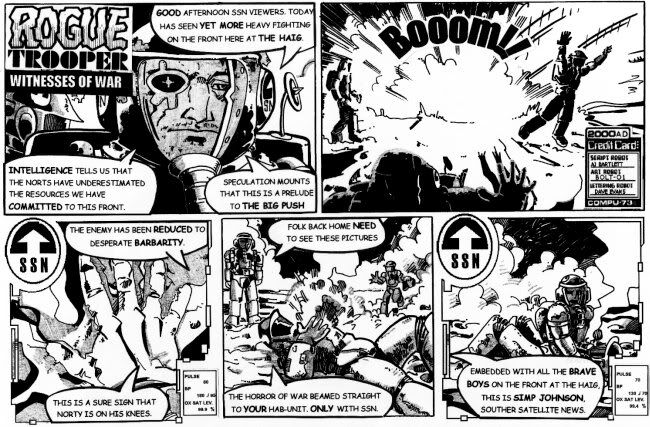
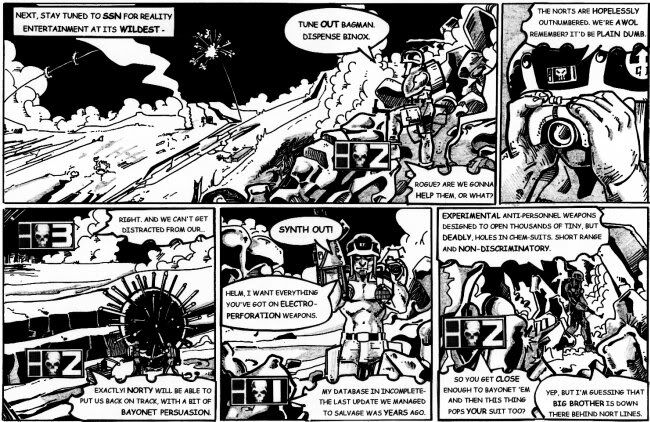
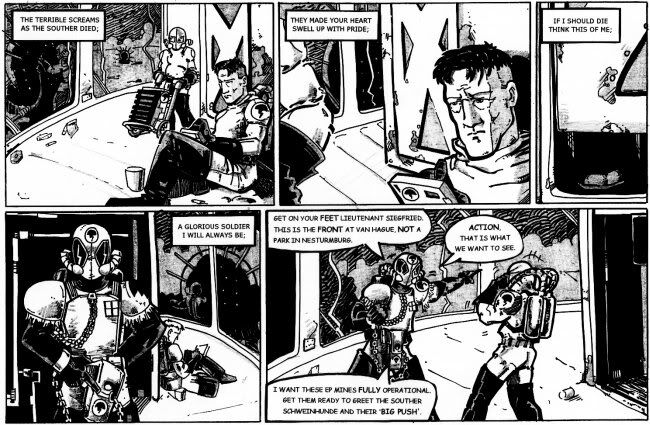
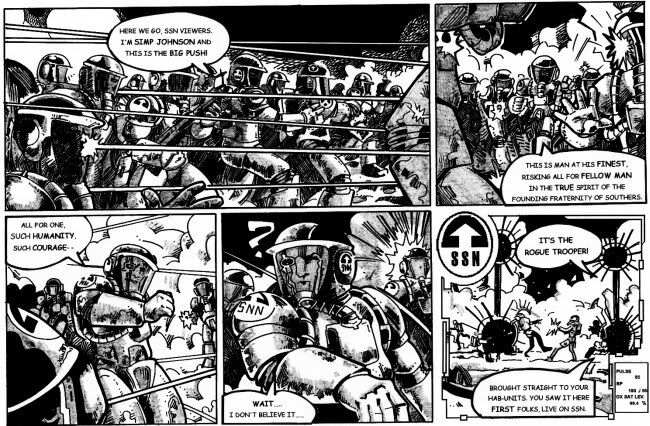
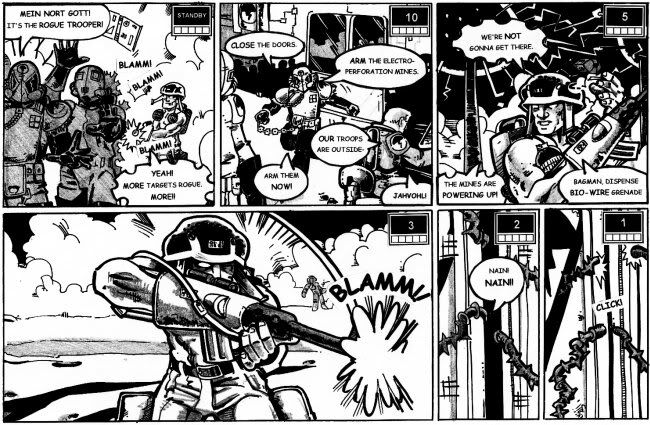
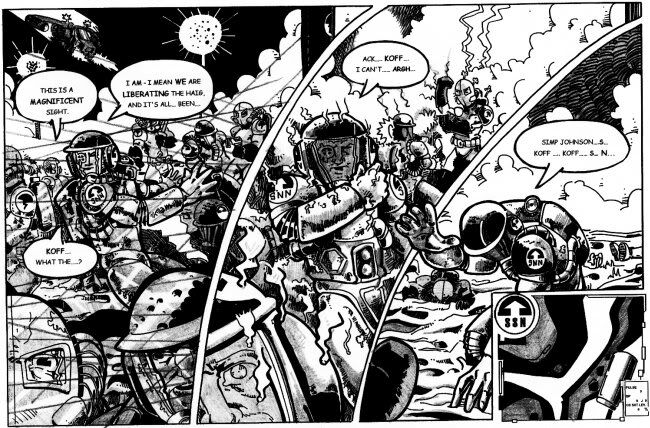
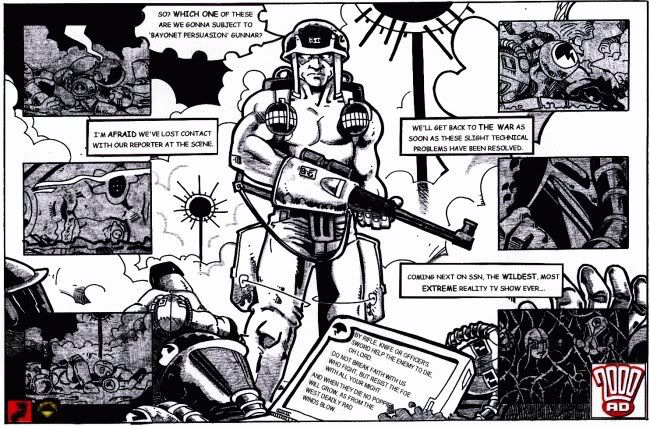
Rogue Trooper copyright Rebellion A/S 2004
This strip was my first collaboration with Dave Evans, and was hosted by the 2000AD fan thrills section of the website. Of course, this is fan fiction and is not endorsed by the creators of Rogue Trooper, 2000AD or the owners of the intellectual property. If you are a member of 2000AD online, go and give it a vote. Dave Evans has worked on various British small-press comic books, including the 2004 Best Independent Comic, Solar Wind. I have also written for Solar Wind, so consider this a plug. As is this; Dave and I are working on a collection of stories that will see print as a collected anthology. Dave has already finished three of the strips – 15 out of 24 pages. There may very well be some teasers for what is tentatively titled ‘Tales of the Contrary’ on this blog.







Rogue Trooper copyright Rebellion A/S 2004
Friday, August 13, 2004
From the Depths - Guilt Trip
Guilt Trip was one of my first scripts and it is easy to look back and see where I went wrong. It was illustrated by Jon Lekton and published in ‘23 Reasons why Summer Camp Didn’t Work Out’ in 2003. It is a shame I didn’t give Jon a better script to work from. Nevertheless, it would be wrong to hide it away, especially as a fair bit of time and effort was put into its production. Jon Lekton can be contacted at JonLektonIsAlive*at*hotmail*dot*com.
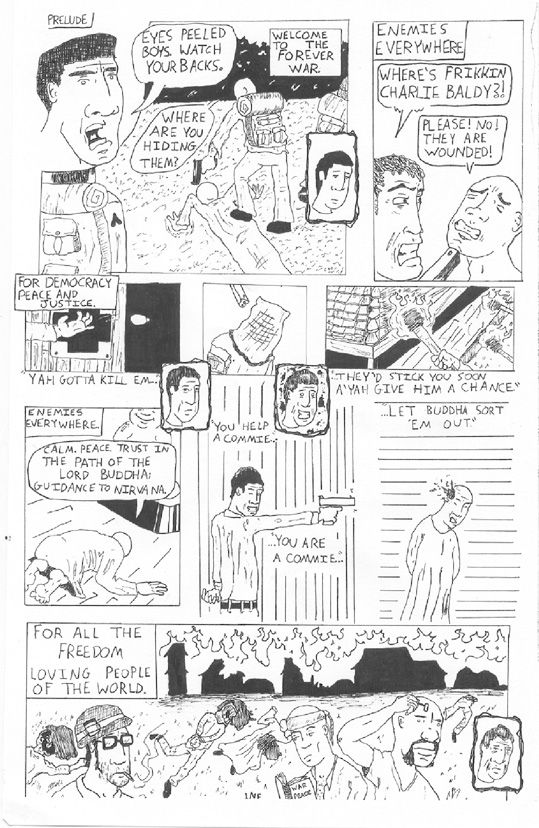
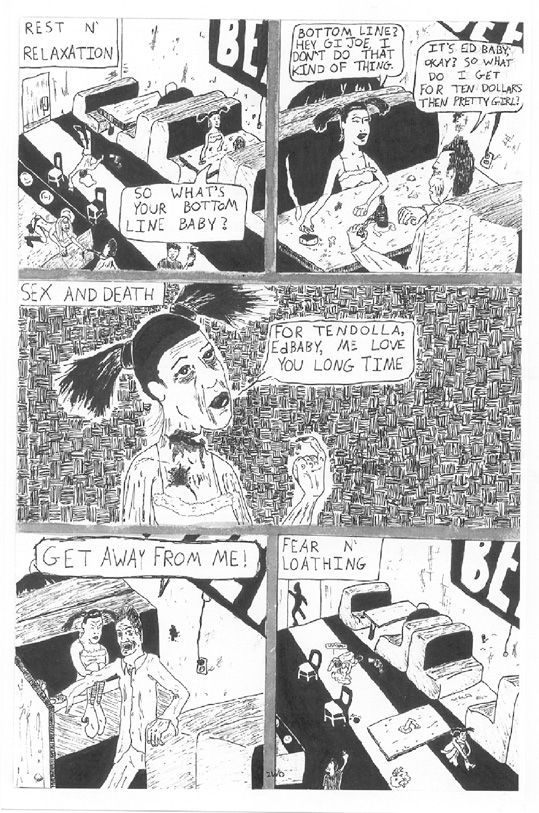
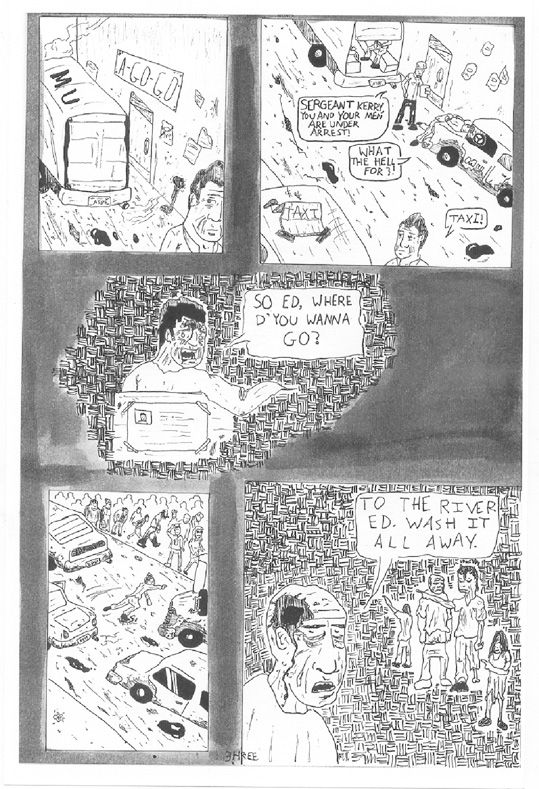
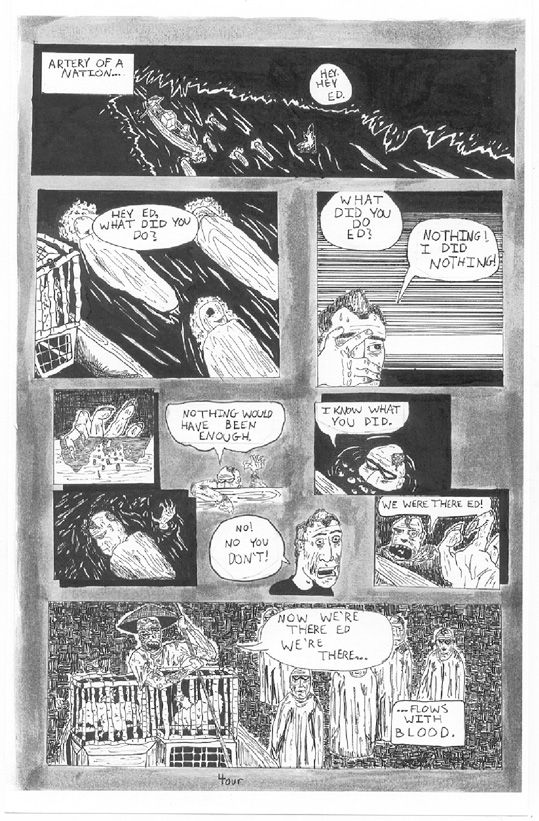
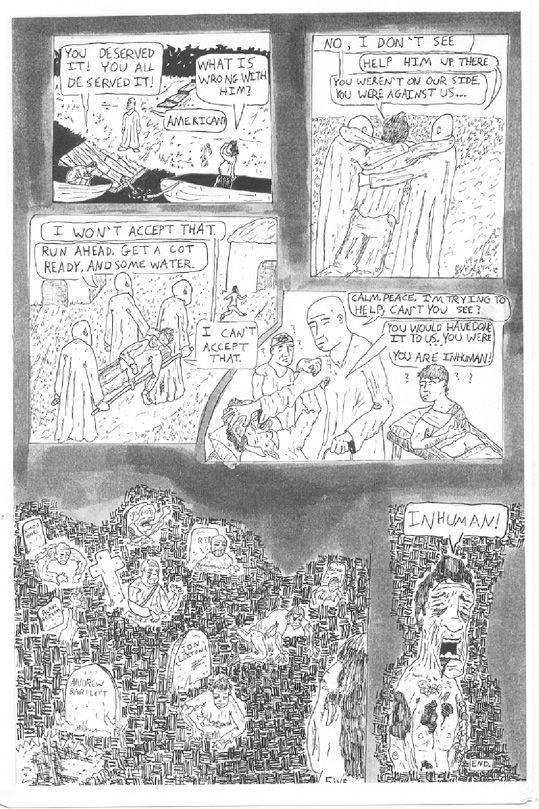





Tuesday, August 10, 2004
A letter to Michael Howard
I have decided to post the letter I have just sent to Michael Howard on the blog. The letter relates to Howard's 'law and order' speech in Middlesborough. The link above refers you to the full text of the speech on the Conservative Party website. It will be interesting to see what sort of reply I get. What I do get will be posted here.
Andrew Bartlett
XX Xxxxxxxxxxxx Xxxxxx
XXXXXXX
XXX XXX
10th August 2004
Michael Howard MP
Folkestone and Hythe Conservative Association
4 Westcliff Gardens
FOLKESTONE
Kent
CT20 1SP
Dear Mr Howard,
I read the full text of your speech on the topic of Law and Order, published on BBC News Online, as delivered in Middlesborough on August 10th 2004. I would like to point out a serious logical error in your argument.
You are reported as saying, ‘many people now believe that they are no longer wholly responsible for their actions. It's someone else's, or something else's fault - the environment, society, the Government.’ You describe sociology as ‘mumbo-jumbo’.
Yet, if people were wholly responsible for their actions, and no causative effect could be ascribed to ‘the environment, society, the Government’, how could any action taken by a future Conservative Government have any effect on the rate of crime?
Given that you are committed to cutting crime, and that you are able to draw distinctions between the results of Conservative policy and Labour policy, I must presume that you ascribe some causative weight to the role of Government in the rate of crime, and therefore the commission of acts of crime by individuals.
How are you to determine between the effects of different policies? Unless the Conservative Party has abandoned reason, it will do so by examining the evidence. By definition, this evidence will be gathered by students of society - sociologists, no less.
Given the inconsistencies in your argument I am forced to make one of two conclusions. The first is that the Conservative Party has abandoned logic and reason. The second is that the Conservative Party believes that by promoting illogical, inconsistent arguments it will convince voters that it holds the answers to make a better Britain. The first conclusion reflects badly on your intellect. The second conclusion reflects badly on your morals.
The promotion of illogical, inconsistent argument is profoundly anti-democratic. Democracy is government by debate, by argument, by parlayment. Poor reasoning should be swept aside by stronger, more consistent argument. But this is not always the case, as the platforms accorded to arguments are not always consistent with their merits. People can be convinced by unreason, when put persuasively and forcefully enough. Yet a collective decision arrived at through a process of unreason is democracy corrupted. Defenders of democracy should, above all else, use the platforms that they have been granted to argue with reason. You have failed to do this. As you are a Member of Parliament, an active and prominent participant in our democratic process, I would like you to explain why.
Yours Sincerely,
Andrew Bartlett
Andrew Bartlett
XX Xxxxxxxxxxxx Xxxxxx
XXXXXXX
XXX XXX
10th August 2004
Michael Howard MP
Folkestone and Hythe Conservative Association
4 Westcliff Gardens
FOLKESTONE
Kent
CT20 1SP
Dear Mr Howard,
I read the full text of your speech on the topic of Law and Order, published on BBC News Online, as delivered in Middlesborough on August 10th 2004. I would like to point out a serious logical error in your argument.
You are reported as saying, ‘many people now believe that they are no longer wholly responsible for their actions. It's someone else's, or something else's fault - the environment, society, the Government.’ You describe sociology as ‘mumbo-jumbo’.
Yet, if people were wholly responsible for their actions, and no causative effect could be ascribed to ‘the environment, society, the Government’, how could any action taken by a future Conservative Government have any effect on the rate of crime?
Given that you are committed to cutting crime, and that you are able to draw distinctions between the results of Conservative policy and Labour policy, I must presume that you ascribe some causative weight to the role of Government in the rate of crime, and therefore the commission of acts of crime by individuals.
How are you to determine between the effects of different policies? Unless the Conservative Party has abandoned reason, it will do so by examining the evidence. By definition, this evidence will be gathered by students of society - sociologists, no less.
Given the inconsistencies in your argument I am forced to make one of two conclusions. The first is that the Conservative Party has abandoned logic and reason. The second is that the Conservative Party believes that by promoting illogical, inconsistent arguments it will convince voters that it holds the answers to make a better Britain. The first conclusion reflects badly on your intellect. The second conclusion reflects badly on your morals.
The promotion of illogical, inconsistent argument is profoundly anti-democratic. Democracy is government by debate, by argument, by parlayment. Poor reasoning should be swept aside by stronger, more consistent argument. But this is not always the case, as the platforms accorded to arguments are not always consistent with their merits. People can be convinced by unreason, when put persuasively and forcefully enough. Yet a collective decision arrived at through a process of unreason is democracy corrupted. Defenders of democracy should, above all else, use the platforms that they have been granted to argue with reason. You have failed to do this. As you are a Member of Parliament, an active and prominent participant in our democratic process, I would like you to explain why.
Yours Sincerely,
Andrew Bartlett
Games - a short-story for Tuesday
I wrote this story some time ago, and Chris Haizlip was kind enough to provide the five illustrations. Chris can be e-mailed at chris*at*cyberspace-market*dot*com. Please leave a comment; advice, criticism and topical links to debt-management services are all welcome.
Games
It seemed inappropriately beautiful, he thought, as the red plume met the clear warm water falling from the tap to fill the mock-porcelain basin. Billowing haematological clouds. He appreciated the abstract magnificence in the image of his life-blood smoothly leaving him. These musings on the artistic quality of his suicide did not last long. He broke from this sentimental study of the aesthetics of death to recommence his researches in mathematics, his professional vocation. Applying the inverse square root law of diffusion to the interface between the clear stream and clouds of scarlet and incorporating his rough knowledge of human biology, he attempted to calculate the amount of time after his expiration at which the liquid in the sink would be of a uniform colour. Practising the one craft he truly understood seemed an appropriate way to end his failed life.
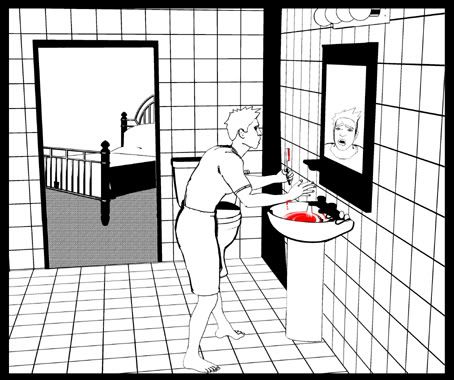
After struggling to push his college cufflinks into place he decided that he would take both bow ties; the clip-on and the traditional tie-it-yourself. Adjusting the strap on the easy to fasten tie, he slipped the other into his pocket, keeping it available for later that evening when the louche image partly afforded by an untied bow may be required. The remainder of that image will be completed by the consumption of fine wines and spirits.
The doorman whose frame obstructed his path took his ticket with a grunt, tore it in half and returned a stub. Open sesame; the massive bulk moved to reveal the glittering treasure cave filled with fortune seekers and thieves.
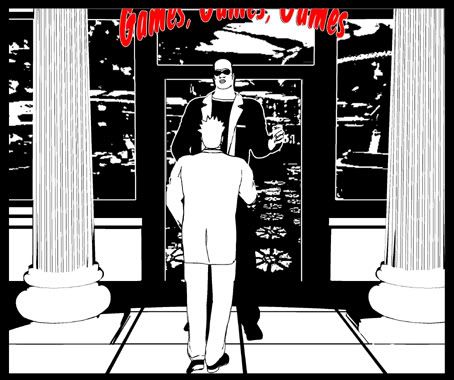
A cold beer was needed to settle his nerves, its crisp flavour offering definition to the confusing array of sensations that greeted him. First came the light, as always; neon and filament; reflected and direct; decorative and functional. Sound followed shortly after, filling his ears; the vulgar beeps and whistles of machines; the dull, inexpressive drone of lounge music; the chatter of drunken excitement. Finally the smells crawled up his nostrils; sweat and alcohol; the subconscious stink of adrenalin.
A second beer relaxed him. He resented the cost, which was at least twice as high as in the rest of this over-priced city, but knew that the numbers on his bill would be meaningless by the end of the night.
*
It is all a numbers game, all mathematics. The descriptive language of the physical universe; a method of writing without ambiguity. His failure to manage the nuances of his native tongue accentuated his self-imposed isolation. Alone, he sought safety in numbers.
*
For tonight at least he has become part of a crowd; a multitude with some understanding of his of his world. Numbers rule their lives to some degree, but they see this world through a clouded vision, confusing the perfect illustration provided by numbers with the impressionistic portrayal from the sensory perceptions.
With this understanding he is able to tame his arrogance, producing a domesticated virtue from that vice. So restrained, he preferred to think of himself as educatedly confident.
*
His chosen game was a simple one; a game of unadulterated chance. Placing wagers on the final resting place of a ball on a spinning theatre of seats, the monetary return is determined by a simple calculation of the odds. Minus a small slice, the cut for the House. It is a game in which it is impossible to be a good player, only a lucky one. His return for the first few spins was purely hormonal, a chemical high as he placed his stipend at the mercy of providence. Providence provided the House with a few months worth.
He had deployed none of his advantages; that would require a greater degree of detachment. Accepting free alcohol as a paltry compensation, on the House, for his poor luck he took a step back, watching the others as they gradually lost their money. A man, younger even than he, placed profligate bets. The man dressed smartly, though that is no guide to wealth, as even he, a comparative pauper, could be a dapper dresser on temporary terms. Perhaps a more accurate measure of wealth is the pleasure taken in the act of losing money, though this is probably not how it is regarded. It is money well spent in the assertion of status. Animalistic; like the purported proving of robust genetics by the taunting dangerous predators; all to impress the hereditary subconscious of prospective mates. Humanly, it seems to work; this man had a flock, a gaggle, a whole school of eager females. Perhaps as these women issue invoices for the time spent in their company the collective term should be pride.
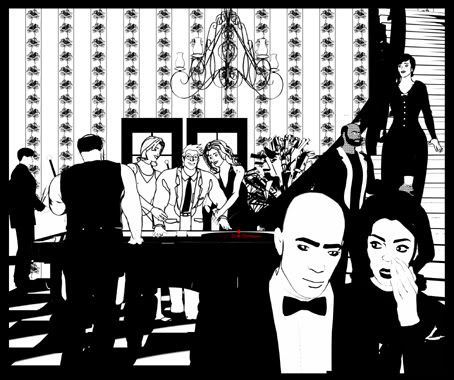
There were so many stories to watch he should count the dramas as innumerable, if he did not know better than to indulge such laziness. It was an odd theatre, more a cast than an audience. Perhaps it was am-dram. There was the senior gentleman, as it was put politely by his colleagues, who played the wise man act, introducing his junior charges to the games. But he lost his money nonetheless.
Somewhere under liberally applied makeup an ancient crone managed to win some money. Too old to be a punk, her pink rinse and spectacularly rouged cheeks were perhaps a stylistic inspiration. Even the over ornate costume jewellery could have been taken straight from a Vivienne Westwood collection. Perhaps the predatory House was softening up this prize, tempting her to overplay her hand.
The croupiers were part of the same grand production, but belonged to a curious classification, both actors and educated spectators. Staging their elaborate ritualised routines, they also play the role of critics, analysing the patterns found in the performance of the players.
*
There were bigger patterns than the personal to be seen in this arena, and these configurations were his speciality. By definition there are underlying patterns in all systems, and humans have the natural capability to perceive these. On occasion the human mind will see arrangement where there is none; it will divine images in the stars and the future in eviscerated entrails. But beyond over-enthusiastic pattern recognition, the human mind is also able to reason. This unique tool can be used to construct theoretical and physical aids towards arrival at a more conservative result. Access to these was essential to the realisation of his personal research; an investigation into methods of fool-proof wealth creation.
*
The observation of the outcomes of games played allowed him to determine the particular phase that the pattern had arrived at, indicating the point at which to enter the game. This was no sure thing, the pattern he had derived from the data was loose, but financial need had trumped the desire for further refinement and so this was a case of playing the percentages. Nevertheless, the pattern was true, and the bets he placed began to pay dividends. Increased available capital allowed him to explore the edges of the mental configuration, reaping ever greater rewards. Wins were interspersed with losses, but wealth accrued, its Sterling value represented on the table by coloured tokens. A representation of a representation, but an extremely useful one regardless; this abstraction being one that can buy you many things.
As the streak of success continued, he heard the crowd that had gathered whisper of 'luck'. He would like to have explained exactly how little of a gamble all this was, though such a philanthropic attitude towards public education would have had a personally impoverishing effect. Rather, he revelled in being the main player, the attraction of the night. Warming to this attention, he quickly learned how to entertain while achieving financial reward. Placing wagers that could not produce a result, he introduced an element of uncertainty, for the audience at least. They gasped as the House gathered in hundreds of counters on a single spin of the wheel, and despite their envy there was a ripple of applause each time he took back a sizeable pile. Though his balance was increasing over time, he decided that this story needed a dramatic conclusion, and began to set up the conditions of his big play.
Exploiting a curious feature of the pattern, he lost a series of bets, drawing sympathy from the crowd. By now he was a high roller, a big player, even though he had brought with him a relatively modest amount; his total worth. This status afforded him personal attention, with staff to steward the audience looking on, an attentive waiter and the duty manager to play the role of his private croupier. The more reckless he became in losing his money, the greater the attention he garnered.
But these wagers were simply the riding out of a dip, the nadir of which he had passed some spins of the wheel ago. Now the pattern was on the upturn, though he did his best to keep this hidden, holding his hand until the absolute peak; the biggest payoff. He would place all that remained in a complex spread of wagers. The tension that drew the crowd in around him did not stretch to include his own state of mind; he was confident in his ability to read the pattern. And this assurance was well placed. Now it was time to ride the pattern right to its zenith, to clear out the House and fill his account. There could be no other consequence but the one he saw, a consequence determined by what had gone before. There was a collective intake of breath as he slid his worth in its entirety onto the red square; he looked up at the duty manager. The croupier looked away, down at the carefully placed wager, hesitated, and began to spin the wheel.
The ball bounced, rolled and settled, impossibly, into a black seat. The sudden rush of adrenalin almost overwhelmed him, and he felt his hands reach out to take back his lost wager. His eyes met the warning gaze of the croupier, issuing a silent caution. His hands reached the counters nonetheless, but before they could drag any riches back they were restrained. In an uncultured accent that was as much an affectation as his own educated tones he heard hard words whispered in his ear. Quiet compliance was impressed upon him, but he urged to rail against it.
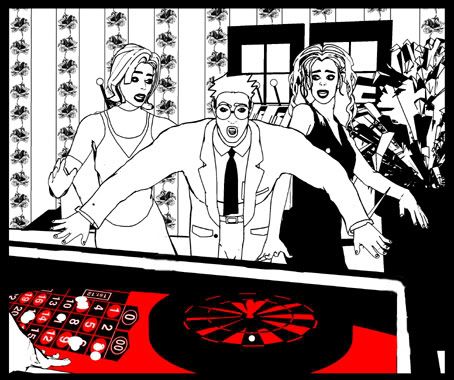
"Cheat!" At least that was his impulsive intention; what emerged was barely a squeak as it forced itself from his throat. The mass of the crowd splintered, the collective becoming individuals; schadenfreude being a miserably divisive happiness. With no money to support his residency he was evicted from the House, tossed materially into the street. The realisation of his loss had left him with little means to oppose the be-suited bouncer's physical manipulation.
***
As he flexed his fingers in the tepid water he disturbed the scarlet clouds. He balled his hands, forming weak, ineffectual fists, blood pumping from his neatly sliced wrists. His drained mind watched as his action disturbed the sharp image, forming a new pattern to replace it. The effect of an actor on the play of events; he saw this after a few clouded moments. The answer to his frustration; he had not been misguided, only, secluded in his ivory tower, he had failed to take into account the actions of the individual. His preferred view of people was that of simple irrelevancies, but that did not alter the reality that it was not so. The forces they exert make them integral parts of the configuration, some deliberate and reasoned inputs, some reckless and instinctive. His system was not fool-proof; he realised that no fully formed drama is devoid of its jester. Racing, his mind concluded that it would not be a simple matter to recast the pattern to include a structure of interacting idiots, but it would not be impossible either. He had to clear his head; he had some theorising to do, some calculations to make, more games to play. Now where are those bandages?
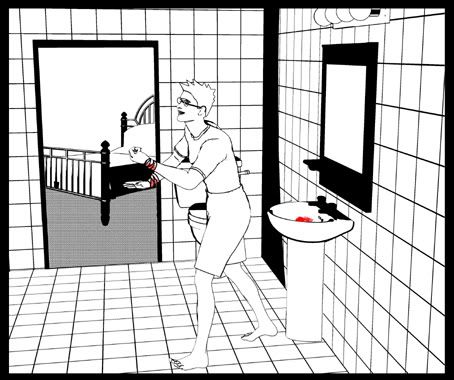
Games
It seemed inappropriately beautiful, he thought, as the red plume met the clear warm water falling from the tap to fill the mock-porcelain basin. Billowing haematological clouds. He appreciated the abstract magnificence in the image of his life-blood smoothly leaving him. These musings on the artistic quality of his suicide did not last long. He broke from this sentimental study of the aesthetics of death to recommence his researches in mathematics, his professional vocation. Applying the inverse square root law of diffusion to the interface between the clear stream and clouds of scarlet and incorporating his rough knowledge of human biology, he attempted to calculate the amount of time after his expiration at which the liquid in the sink would be of a uniform colour. Practising the one craft he truly understood seemed an appropriate way to end his failed life.

After struggling to push his college cufflinks into place he decided that he would take both bow ties; the clip-on and the traditional tie-it-yourself. Adjusting the strap on the easy to fasten tie, he slipped the other into his pocket, keeping it available for later that evening when the louche image partly afforded by an untied bow may be required. The remainder of that image will be completed by the consumption of fine wines and spirits.
The doorman whose frame obstructed his path took his ticket with a grunt, tore it in half and returned a stub. Open sesame; the massive bulk moved to reveal the glittering treasure cave filled with fortune seekers and thieves.

A cold beer was needed to settle his nerves, its crisp flavour offering definition to the confusing array of sensations that greeted him. First came the light, as always; neon and filament; reflected and direct; decorative and functional. Sound followed shortly after, filling his ears; the vulgar beeps and whistles of machines; the dull, inexpressive drone of lounge music; the chatter of drunken excitement. Finally the smells crawled up his nostrils; sweat and alcohol; the subconscious stink of adrenalin.
A second beer relaxed him. He resented the cost, which was at least twice as high as in the rest of this over-priced city, but knew that the numbers on his bill would be meaningless by the end of the night.
*
It is all a numbers game, all mathematics. The descriptive language of the physical universe; a method of writing without ambiguity. His failure to manage the nuances of his native tongue accentuated his self-imposed isolation. Alone, he sought safety in numbers.
*
For tonight at least he has become part of a crowd; a multitude with some understanding of his of his world. Numbers rule their lives to some degree, but they see this world through a clouded vision, confusing the perfect illustration provided by numbers with the impressionistic portrayal from the sensory perceptions.
With this understanding he is able to tame his arrogance, producing a domesticated virtue from that vice. So restrained, he preferred to think of himself as educatedly confident.
*
His chosen game was a simple one; a game of unadulterated chance. Placing wagers on the final resting place of a ball on a spinning theatre of seats, the monetary return is determined by a simple calculation of the odds. Minus a small slice, the cut for the House. It is a game in which it is impossible to be a good player, only a lucky one. His return for the first few spins was purely hormonal, a chemical high as he placed his stipend at the mercy of providence. Providence provided the House with a few months worth.
He had deployed none of his advantages; that would require a greater degree of detachment. Accepting free alcohol as a paltry compensation, on the House, for his poor luck he took a step back, watching the others as they gradually lost their money. A man, younger even than he, placed profligate bets. The man dressed smartly, though that is no guide to wealth, as even he, a comparative pauper, could be a dapper dresser on temporary terms. Perhaps a more accurate measure of wealth is the pleasure taken in the act of losing money, though this is probably not how it is regarded. It is money well spent in the assertion of status. Animalistic; like the purported proving of robust genetics by the taunting dangerous predators; all to impress the hereditary subconscious of prospective mates. Humanly, it seems to work; this man had a flock, a gaggle, a whole school of eager females. Perhaps as these women issue invoices for the time spent in their company the collective term should be pride.

There were so many stories to watch he should count the dramas as innumerable, if he did not know better than to indulge such laziness. It was an odd theatre, more a cast than an audience. Perhaps it was am-dram. There was the senior gentleman, as it was put politely by his colleagues, who played the wise man act, introducing his junior charges to the games. But he lost his money nonetheless.
Somewhere under liberally applied makeup an ancient crone managed to win some money. Too old to be a punk, her pink rinse and spectacularly rouged cheeks were perhaps a stylistic inspiration. Even the over ornate costume jewellery could have been taken straight from a Vivienne Westwood collection. Perhaps the predatory House was softening up this prize, tempting her to overplay her hand.
The croupiers were part of the same grand production, but belonged to a curious classification, both actors and educated spectators. Staging their elaborate ritualised routines, they also play the role of critics, analysing the patterns found in the performance of the players.
*
There were bigger patterns than the personal to be seen in this arena, and these configurations were his speciality. By definition there are underlying patterns in all systems, and humans have the natural capability to perceive these. On occasion the human mind will see arrangement where there is none; it will divine images in the stars and the future in eviscerated entrails. But beyond over-enthusiastic pattern recognition, the human mind is also able to reason. This unique tool can be used to construct theoretical and physical aids towards arrival at a more conservative result. Access to these was essential to the realisation of his personal research; an investigation into methods of fool-proof wealth creation.
*
The observation of the outcomes of games played allowed him to determine the particular phase that the pattern had arrived at, indicating the point at which to enter the game. This was no sure thing, the pattern he had derived from the data was loose, but financial need had trumped the desire for further refinement and so this was a case of playing the percentages. Nevertheless, the pattern was true, and the bets he placed began to pay dividends. Increased available capital allowed him to explore the edges of the mental configuration, reaping ever greater rewards. Wins were interspersed with losses, but wealth accrued, its Sterling value represented on the table by coloured tokens. A representation of a representation, but an extremely useful one regardless; this abstraction being one that can buy you many things.
As the streak of success continued, he heard the crowd that had gathered whisper of 'luck'. He would like to have explained exactly how little of a gamble all this was, though such a philanthropic attitude towards public education would have had a personally impoverishing effect. Rather, he revelled in being the main player, the attraction of the night. Warming to this attention, he quickly learned how to entertain while achieving financial reward. Placing wagers that could not produce a result, he introduced an element of uncertainty, for the audience at least. They gasped as the House gathered in hundreds of counters on a single spin of the wheel, and despite their envy there was a ripple of applause each time he took back a sizeable pile. Though his balance was increasing over time, he decided that this story needed a dramatic conclusion, and began to set up the conditions of his big play.
Exploiting a curious feature of the pattern, he lost a series of bets, drawing sympathy from the crowd. By now he was a high roller, a big player, even though he had brought with him a relatively modest amount; his total worth. This status afforded him personal attention, with staff to steward the audience looking on, an attentive waiter and the duty manager to play the role of his private croupier. The more reckless he became in losing his money, the greater the attention he garnered.
But these wagers were simply the riding out of a dip, the nadir of which he had passed some spins of the wheel ago. Now the pattern was on the upturn, though he did his best to keep this hidden, holding his hand until the absolute peak; the biggest payoff. He would place all that remained in a complex spread of wagers. The tension that drew the crowd in around him did not stretch to include his own state of mind; he was confident in his ability to read the pattern. And this assurance was well placed. Now it was time to ride the pattern right to its zenith, to clear out the House and fill his account. There could be no other consequence but the one he saw, a consequence determined by what had gone before. There was a collective intake of breath as he slid his worth in its entirety onto the red square; he looked up at the duty manager. The croupier looked away, down at the carefully placed wager, hesitated, and began to spin the wheel.
The ball bounced, rolled and settled, impossibly, into a black seat. The sudden rush of adrenalin almost overwhelmed him, and he felt his hands reach out to take back his lost wager. His eyes met the warning gaze of the croupier, issuing a silent caution. His hands reached the counters nonetheless, but before they could drag any riches back they were restrained. In an uncultured accent that was as much an affectation as his own educated tones he heard hard words whispered in his ear. Quiet compliance was impressed upon him, but he urged to rail against it.

"Cheat!" At least that was his impulsive intention; what emerged was barely a squeak as it forced itself from his throat. The mass of the crowd splintered, the collective becoming individuals; schadenfreude being a miserably divisive happiness. With no money to support his residency he was evicted from the House, tossed materially into the street. The realisation of his loss had left him with little means to oppose the be-suited bouncer's physical manipulation.
***
As he flexed his fingers in the tepid water he disturbed the scarlet clouds. He balled his hands, forming weak, ineffectual fists, blood pumping from his neatly sliced wrists. His drained mind watched as his action disturbed the sharp image, forming a new pattern to replace it. The effect of an actor on the play of events; he saw this after a few clouded moments. The answer to his frustration; he had not been misguided, only, secluded in his ivory tower, he had failed to take into account the actions of the individual. His preferred view of people was that of simple irrelevancies, but that did not alter the reality that it was not so. The forces they exert make them integral parts of the configuration, some deliberate and reasoned inputs, some reckless and instinctive. His system was not fool-proof; he realised that no fully formed drama is devoid of its jester. Racing, his mind concluded that it would not be a simple matter to recast the pattern to include a structure of interacting idiots, but it would not be impossible either. He had to clear his head; he had some theorising to do, some calculations to make, more games to play. Now where are those bandages?

Monday, August 09, 2004
Higher, Faster, Stronger - at what sacrifice?
With the opening ceremony of the Athens Olympics only four days away, today’s Guardian features an essay by Lincoln Allison which asks, ‘is it really so wrong for an athlete to use performance-enhancing drugs?’ Read his article, as it is a lot better than what I have written below.
Given the recent BALCO scandal in athletics that threatens to ruin the US track and field team’s chances of glory in Athens, the use of drugs in sport is a topic on which I have recently been thinking. Of course, on hearing that medal winners and record holders had tested positive for banned substances, my instinct was that the punishment and shame drug cheats faced was entirely deserved. If you take a substance on the banned list you face expulsion from the sporting arena. But why do we have this rule? Why are performance-enhancing drugs banned in sport?
The strongest argument seems to be that it is a question of ‘fairness’; that those athletes who use performance-enhancing drugs gain an unfair advantage over their rivals. But that simply pushes the question a stage further back, so we ask; in what way does this advantage differ from other advantages that an athlete may possess? After all, if no athlete possessed any advantages over another sport would lose its meaning; every race would end in a dead-heat. Are there any advantages that athletes deploy that are similar in nature to drug taking? I feel that there are, and they are training and nutrition.
The training facilities and nutritional resources available to athletes differ enormously. An athlete with good financial support, whether this is through government-funded schemes, corporate sponsorship or family backing, will have access to all of these resources, but the same cannot be said from athletes from countries whose governments have a poor record of investment in sport, who eschew, or are not marketable enough for advertising roles, or who belong to families without the money to support their promising athletic members. Briefly, it is evident that performance and success in sport relies not only on some ‘inborn ability’ or ‘desire for glory’ or even ‘the eye of the tiger’, but on a whole array of resources, wider than those mentioned above, that vary between athletes in manners that are quite beyond their control.
But, say some supporters of the current status quo in professional athletics, compared to well-resourced training regimes or carefully optimised diets, drugs are categorically different. They harm the user, and we cannot have a sport in which success demands on the athletes’ willingness to sacrifice later heath and life in order to gain glory now. But stories of modern sport tells us that success is achieved through self-denial, through training regimes described with the adjective ‘punishing’ and through playing the gamble of dedication. In what way is it more moral for us to expect a child to become athletes – for that is the price of success – than for us to expect an adult athlete to boost his or her performance pharmaceutically?
Perhaps I am not giving great enough gravity to the harm that is caused by drugs. They kill. But so can nutrition, training and competition. To take two extreme examples, sumo wrestlers, by the nature of the nutritional regime required for participation, face drastically shortened life expectancies. Boxers, due to the goal of the sport itself, face a future plagued by brain damage. Less drastically, many athletes face a retirement dogged by arthritis and other muscular and skeletal problems. We could adopt a system by which training was limited and short-term nutritional programmes restricted, to ensure that the participants in the Olympics could minimise their risk of, for example, long-term joint damage. A training and nutrition covenant perhaps, a reminder of the amateur ethos without the class-prejudice this carries.
But there is another problem, and that is the consumer of professional sport – the audience. Would we want to see athletes breaking world records thanks to drugs? Allison argues that the evidence from America suggests that we wouldn’t care. A second article from the Guardian suggests that performance at this year’s Olympics will be poorer than in previous years, and that this decline in standards will be due to effective anti-doping measures. But sport is an entertainment business; so we are told when those who hold the purse-strings depart from the ‘ethos of sport’, often by opposing any levelling of he playing field, any attempt to combat ‘unfairness’.
I am not calling for performance-enhancing drugs to be allowed into the bodies that will run on the track in Athens next week. But I do suggest the arguments that oppose drugs in sport should also oppose damaging over-training, unhealthy nutrition, over-competition, and even the development of socially unhealthy psychologies deemed necessary for sporting success. If it is about fairness, then that is what we should stand up for. If sport is to be a business, with all the unfairness that implies, then the argument for keeping drugs out of sport in bankrupt.
World Anti-Doping Agency
Given the recent BALCO scandal in athletics that threatens to ruin the US track and field team’s chances of glory in Athens, the use of drugs in sport is a topic on which I have recently been thinking. Of course, on hearing that medal winners and record holders had tested positive for banned substances, my instinct was that the punishment and shame drug cheats faced was entirely deserved. If you take a substance on the banned list you face expulsion from the sporting arena. But why do we have this rule? Why are performance-enhancing drugs banned in sport?
The strongest argument seems to be that it is a question of ‘fairness’; that those athletes who use performance-enhancing drugs gain an unfair advantage over their rivals. But that simply pushes the question a stage further back, so we ask; in what way does this advantage differ from other advantages that an athlete may possess? After all, if no athlete possessed any advantages over another sport would lose its meaning; every race would end in a dead-heat. Are there any advantages that athletes deploy that are similar in nature to drug taking? I feel that there are, and they are training and nutrition.
The training facilities and nutritional resources available to athletes differ enormously. An athlete with good financial support, whether this is through government-funded schemes, corporate sponsorship or family backing, will have access to all of these resources, but the same cannot be said from athletes from countries whose governments have a poor record of investment in sport, who eschew, or are not marketable enough for advertising roles, or who belong to families without the money to support their promising athletic members. Briefly, it is evident that performance and success in sport relies not only on some ‘inborn ability’ or ‘desire for glory’ or even ‘the eye of the tiger’, but on a whole array of resources, wider than those mentioned above, that vary between athletes in manners that are quite beyond their control.
But, say some supporters of the current status quo in professional athletics, compared to well-resourced training regimes or carefully optimised diets, drugs are categorically different. They harm the user, and we cannot have a sport in which success demands on the athletes’ willingness to sacrifice later heath and life in order to gain glory now. But stories of modern sport tells us that success is achieved through self-denial, through training regimes described with the adjective ‘punishing’ and through playing the gamble of dedication. In what way is it more moral for us to expect a child to become athletes – for that is the price of success – than for us to expect an adult athlete to boost his or her performance pharmaceutically?
Perhaps I am not giving great enough gravity to the harm that is caused by drugs. They kill. But so can nutrition, training and competition. To take two extreme examples, sumo wrestlers, by the nature of the nutritional regime required for participation, face drastically shortened life expectancies. Boxers, due to the goal of the sport itself, face a future plagued by brain damage. Less drastically, many athletes face a retirement dogged by arthritis and other muscular and skeletal problems. We could adopt a system by which training was limited and short-term nutritional programmes restricted, to ensure that the participants in the Olympics could minimise their risk of, for example, long-term joint damage. A training and nutrition covenant perhaps, a reminder of the amateur ethos without the class-prejudice this carries.
But there is another problem, and that is the consumer of professional sport – the audience. Would we want to see athletes breaking world records thanks to drugs? Allison argues that the evidence from America suggests that we wouldn’t care. A second article from the Guardian suggests that performance at this year’s Olympics will be poorer than in previous years, and that this decline in standards will be due to effective anti-doping measures. But sport is an entertainment business; so we are told when those who hold the purse-strings depart from the ‘ethos of sport’, often by opposing any levelling of he playing field, any attempt to combat ‘unfairness’.
I am not calling for performance-enhancing drugs to be allowed into the bodies that will run on the track in Athens next week. But I do suggest the arguments that oppose drugs in sport should also oppose damaging over-training, unhealthy nutrition, over-competition, and even the development of socially unhealthy psychologies deemed necessary for sporting success. If it is about fairness, then that is what we should stand up for. If sport is to be a business, with all the unfairness that implies, then the argument for keeping drugs out of sport in bankrupt.
World Anti-Doping Agency
Saturday, August 07, 2004
Heresy: the History of Alberto Comma - Friday Fiction
Over the next few weeks I'll be posting some of my comic book stories. I've chosen to start with one of my first scripts. Amber Stone performed the art duties on this, which appeared on the defunct New Nocturne Fiction web-site. Amber has a web-site here, and can be contacted at amber.stone*at*toy-republic*dot*com.
Without too much ado, here are the pages. Your comments, even the negative ones, will be welcome.
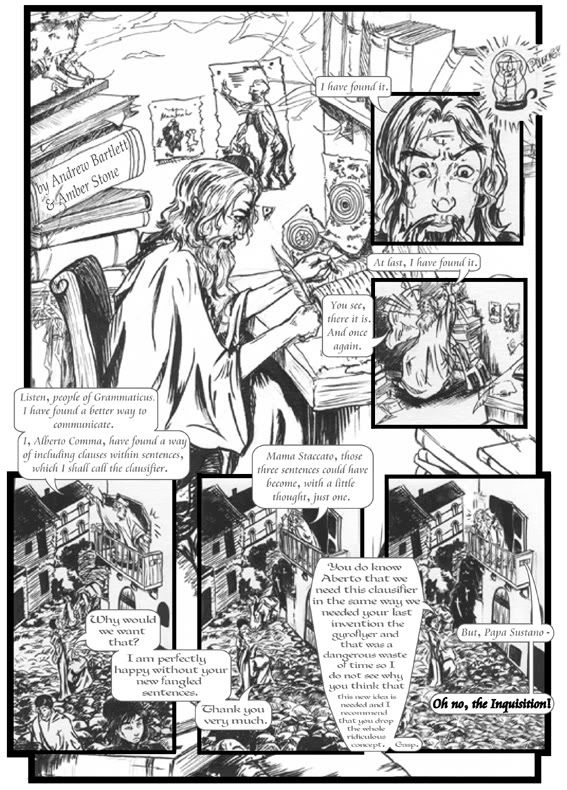
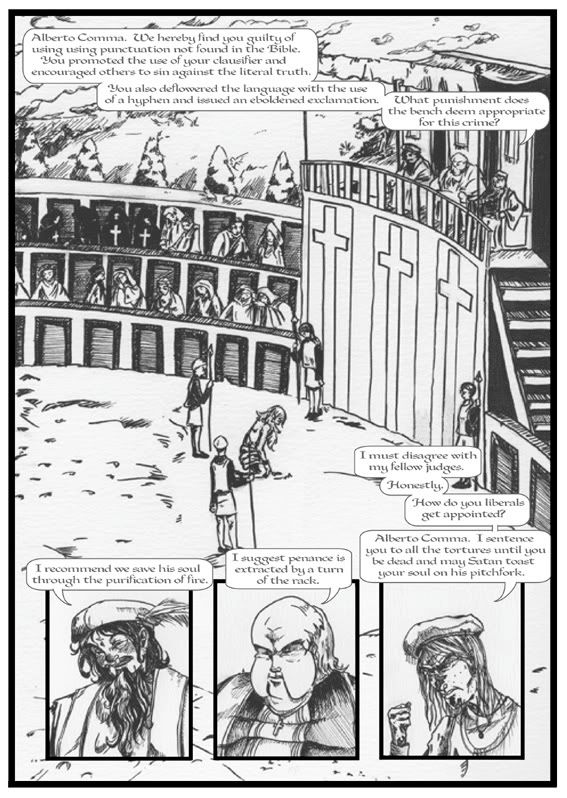
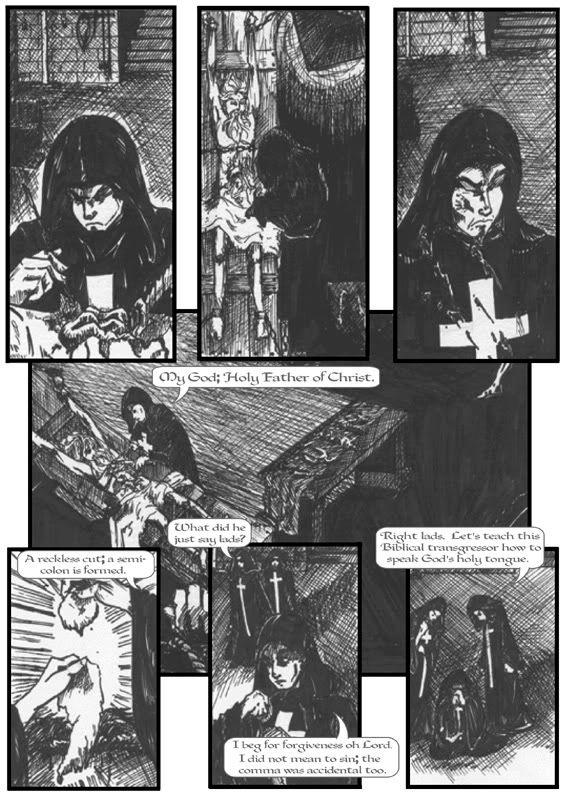
Without too much ado, here are the pages. Your comments, even the negative ones, will be welcome.



Welcome to Bartlett's Bizarre Bazaar
Hello and welcome. I'll be using this as my space on the web, a place to record my thoughts and opinions and to publish and publicise my writing. I welcome all comments, but please keep all posts literate, at least.
Cheers
Cheers
Archives
August 2004 September 2004 October 2004 November 2004 December 2004 January 2005 February 2005 March 2005 April 2005 May 2005 June 2005 July 2005 August 2005 September 2005 October 2005 November 2005 December 2005 January 2006 February 2006 March 2006 April 2006 May 2006 June 2006 July 2006 August 2006 September 2006 October 2006 November 2006 December 2006 January 2007 March 2007